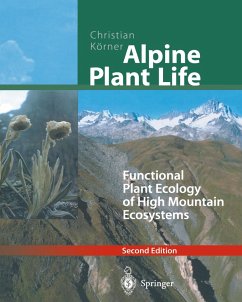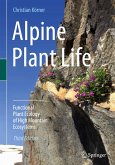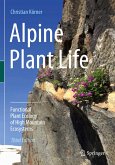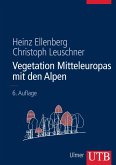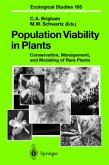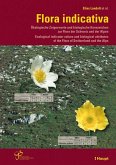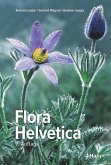Generations of plant scientists have been fascinated by alpine plant life - with the exposure of organisms to dramatic climatic gradients over a very short distance. This comprehensive text treats a wide range of topics: alpine climate and soils, plant distribution and the treeline phenomenon, physiological ecology of water-, nutritional- and carbon relations of alpine plants, plant stress and plant development, biomass production, and aspects of human impacts on alpine vegetation. Geographically the book covers all parts of the world including the tropics.This second edition of Alpine Plant Life gives new references, new diagrams, and extensively revised chapters.
From the reviews of the first edition "This book should be required reading for all ecologists and ecology students. Modern treatment of alpine ecology and the inclusion of tropics and good treatment of tropical alpine environments makes this book unique. ...the best modern treatment of "functional ecology" of alpine plants. Both the author and the publisher should be commended for this book." (Botanical Electronic News) "For anyone interested in alpine plant ecology (or ecophysiology) this book is a must, being encyclopaedic in both scope and information content. Though it deals with potentially complex topics, the book has been organised carefully and logically, and the topics are treated with a simple yet elegant writing style which exudes the author's enthusiasm and fascination. It was a delight to read, like a good novel that one is reluctant to set down. ... a most impressive and comprehensive, up-to-the-minute book by undoubtedly the world's foremost alpine plant ecologist and ecophysiologist." (New Zealand Journal of Ecology) "The structure of the book and the approach in presenting information make it easy to read. Highlighted information throughout the chapters and summaries at the end of each chapter assist readers in recapturing important information. Color plates included at the end of the book serve as a good summary of the book´s contents. ... provides the most up-to-date information about the ecology of plants at high altitudes." (Mountain Research and Development).
"The book may serve not only as an excellent reference source for ecophysiological topics, but also as a source of fresh ideas and inspiration for a much broader readership." (Leos Klimes, Folia Geobotanica, Vol. 41 (4), 2006)
" ... the best modern treatment of "functional ecology" of alpine plants that I have seen. ... this new edition added over 100 new references, new diagrams and revised and extended several chapters. ... an excellent summary and key to the study of plant-habitat relationships. ... should be a compulsory reading for every plant ecologist. In my library it is right next to the Larcher's Physiological Plant Ecology." (Botanical Electronic News)
"This is a fascinating synthesis on plant life at high altitude all around the world. There have been a number of studies on this topic, but the book by C. Körner is not just an addition to an already long list of publications. It attempts a synthesis based on a thorough functional analysis of the processescontrolling plant life in these extreme situation, and on a broad overview of many of the mountain areaas around the world. ... It is also a very useful tool for ecophysiologists, because all the questions addressed are carefully analysed under the different relevant view points. ... In brief, this book is a model study for ecologists and ecophysiologists." (Annals of Forest Science)
"Alpine Plant Life proved to be the right book for those who are either advanced gardeners or for those with scientific interests in the alpine ecosystems. This book is divided into 17 chapters beginning with the discussion of "Plant Ecology at High Elevations" and ending with an excellent discussion of "Global Change at High Elevation". ... Several color plates supplement the black and white photographs included throughout the book." (Diana Pederson, BellaOnline's Environment, June, 2004)
"Korner, a renowned alpine ecophysiologist, synthesizes the accumulated knowledge of generations ofalpine life scientists in this encyclopedic book. Introduces the alpine plant zone ... . Examines the interation between plant, wind ... . Discusses the physics of alpine soil ... . Reviews the uptake and loss of carbon ... . Analyses plant growth function, cell division ... . Extensively referenced, 218 figures, 4 color plates, and 47 tables. For ecologists and ecology students." (Northeastern Naturalist, Vol. 11(3), 2004)
"This book is the best modern treatment of 'functional ecology' of alpine plants that I have seen. The new edition, in hard copy book, costs less ... . At the same time, this new edition added over ... . This book is an excellent summary and key to the study of plant-habitat relationships. The Alpine Plant Life by Christian Koerner should be a compulsory (sic) reading for every plant ecologist." (Adolf Ceska, Botanical Electronic News, September 2004)
"The second edition has been revised, updated and enlarged. ... very clearly structured presentations of examples, discussions of arguments ... . As a result, the reader is not left alone with a wealth of details; rather, he/she becomes guided ... . In summary, Körner's "Alpine Plant Life" is an overview and manual for the scene, and will be a must for every scientific library. Moreover, it is very useful for the private book shelf for everybody who is engaged in research ... ." (Rainer Lösch, Phytocoenologia, Vol. 34(4), 2004)
"This is a fascinating synthesis on plant life at high altitude all around the world. ... is not just an addition to an already long list of publication. ... It is also a very useful tool for ecophysiologists, because all the questions addressed are carefully analysed under the different relevant view points. ... As such, it is a nice illustration of the way ecophysiological thinking may proceed. The best example ... . In brief, this book is a model study for ecologists and ecophysiologists." (Erwin Dreyer, Annals of Forest Science, Vol. 61(5), 2004)
"... a welcome second edition. ... It is a superb textbook - well written with plenty of good quality photographs, graphs and diagrams. It hits a happy compromise in being accessible to novices in upland areas and/or plants but with sufficient depth to leave the reader feeling that they have got to grips with the topic. The book starts with reviews of alpine life zones, climate, soils ... . A superb textbook that should be read and used by all ecology students."(Bulletin of the British Ecological Society, Vol. 35(1), 2004)
" ... the best modern treatment of "functional ecology" of alpine plants that I have seen. ... this new edition added over 100 new references, new diagrams and revised and extended several chapters. ... an excellent summary and key to the study of plant-habitat relationships. ... should be a compulsory reading for every plant ecologist. In my library it is right next to the Larcher's Physiological Plant Ecology." (Botanical Electronic News)
"This is a fascinating synthesis on plant life at high altitude all around the world. There have been a number of studies on this topic, but the book by C. Körner is not just an addition to an already long list of publications. It attempts a synthesis based on a thorough functional analysis of the processescontrolling plant life in these extreme situation, and on a broad overview of many of the mountain areaas around the world. ... It is also a very useful tool for ecophysiologists, because all the questions addressed are carefully analysed under the different relevant view points. ... In brief, this book is a model study for ecologists and ecophysiologists." (Annals of Forest Science)
"Alpine Plant Life proved to be the right book for those who are either advanced gardeners or for those with scientific interests in the alpine ecosystems. This book is divided into 17 chapters beginning with the discussion of "Plant Ecology at High Elevations" and ending with an excellent discussion of "Global Change at High Elevation". ... Several color plates supplement the black and white photographs included throughout the book." (Diana Pederson, BellaOnline's Environment, June, 2004)
"Korner, a renowned alpine ecophysiologist, synthesizes the accumulated knowledge of generations ofalpine life scientists in this encyclopedic book. Introduces the alpine plant zone ... . Examines the interation between plant, wind ... . Discusses the physics of alpine soil ... . Reviews the uptake and loss of carbon ... . Analyses plant growth function, cell division ... . Extensively referenced, 218 figures, 4 color plates, and 47 tables. For ecologists and ecology students." (Northeastern Naturalist, Vol. 11(3), 2004)
"This book is the best modern treatment of 'functional ecology' of alpine plants that I have seen. The new edition, in hard copy book, costs less ... . At the same time, this new edition added over ... . This book is an excellent summary and key to the study of plant-habitat relationships. The Alpine Plant Life by Christian Koerner should be a compulsory (sic) reading for every plant ecologist." (Adolf Ceska, Botanical Electronic News, September 2004)
"The second edition has been revised, updated and enlarged. ... very clearly structured presentations of examples, discussions of arguments ... . As a result, the reader is not left alone with a wealth of details; rather, he/she becomes guided ... . In summary, Körner's "Alpine Plant Life" is an overview and manual for the scene, and will be a must for every scientific library. Moreover, it is very useful for the private book shelf for everybody who is engaged in research ... ." (Rainer Lösch, Phytocoenologia, Vol. 34(4), 2004)
"This is a fascinating synthesis on plant life at high altitude all around the world. ... is not just an addition to an already long list of publication. ... It is also a very useful tool for ecophysiologists, because all the questions addressed are carefully analysed under the different relevant view points. ... As such, it is a nice illustration of the way ecophysiological thinking may proceed. The best example ... . In brief, this book is a model study for ecologists and ecophysiologists." (Erwin Dreyer, Annals of Forest Science, Vol. 61(5), 2004)
"... a welcome second edition. ... It is a superb textbook - well written with plenty of good quality photographs, graphs and diagrams. It hits a happy compromise in being accessible to novices in upland areas and/or plants but with sufficient depth to leave the reader feeling that they have got to grips with the topic. The book starts with reviews of alpine life zones, climate, soils ... . A superb textbook that should be read and used by all ecology students."(Bulletin of the British Ecological Society, Vol. 35(1), 2004)

